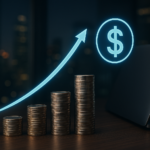The digital currency market faces significant scrutiny as the SEC charges Unicoin, spotlighting risk factors in the crypto industry. Allegations of fraud tarnish the reputation of a company that claims to lead with an “America First” vision. As crypto regulations evolve under varying administration policies, industry players like Unicoin confront new challenges. Despite its aspirations for prominence, Unicoin faces critical questions regarding the alleged discrepancies in its investment strategies and asset claims.
The SEC’s charges against Unicoin contrast with previous instances where the company was not penalized despite potential non-compliance. Under previous leadership, regulatory actions were either adjusted or relaxed, resulting in some crypto entities escaping strict penalties. Presently, the SEC aims to reinforce compliance, indicating a shift in enforcement that now holds Unicoin and its executives accountable. This shift may redefine the crypto landscape, where transparency and reliability become pivotal.
Who Are the Key Players?
The SEC targets Unicoin’s senior executives: CEO Alex Konanykhin, former president Silvina Moschini, and former Chief Investment Officer Alex Dominguez. These leaders are accused of orchestrating misleading investment schemes that promised crypto tokens backed by substantial real estate assets. However, the SEC claims these real estate portfolios were overstated, resulting in deceptive practices.
What Is the Alleged Impact on Investors?
Investors in Unicoin are left assessing the financial impact after the firm allegedly collected over $100 million based on misrepresented asset claims. SEC’s accusations uncover how investors might have been led to believe in the strong backing of their investments, which, in reality, were supported by mere fragments of promised collateral.
Mark Cave of the SEC underscores the severity of these allegations, shedding light on potential exploitation involving thousands of investors.
“The real estate assets were worth a mere fraction of what the company claimed.”
Such statements highlight the crux of accusations Unicoin faces today.
In response, Konanykhin has publicly disputed these allegations, claiming there’s an unjust targeting of Unicoin. He suggests that the enforcement environment has fluctuated under President Trump’s policies, seemingly hinting at deregulation, though this did not spare his firm from action.
Despite ongoing litigation, other firms like Coinbase find themselves under similar investigations, pointing to a widespread regulatory net. Paul Grewal of Coinbase similarly noted ongoing scrutiny stemming from reported user metrics.
“A holdover investigation from the prior administration.”
This emphasizes a continual SEC vigilance toward transparency in crypto dealings.
As crypto remains at the forefront of technological advancement, the SEC’s actions against Unicoin are pivotal in shaping future regulatory landscapes. This lawsuit serves as a reminder of the ongoing checks necessary to maintain fair and legal market practices. Understanding regulatory boundaries and investor rights can guide better business conduct in crypto ventures.










